Long ago, when I used to post essays, thoughts, snippets and more on Facebook, I would talk about books I liked—or films, or music, or any of the myriad other forms of creativity we humans enjoy. No negative reviews, just a sharing of the positive, of the joyous, the thoughtful, the incredible. Then, I stopped.
At some point, some years ago now, I was tagged by Aurélie and tasked to post ten pictures of bookcovers, without explanation, just the author and title: books that I loved, books I wanted to share with others—very much in the vein of M.E. Rothwell’s excellent newsletter, The Books That Made Us.
Being contrary, rather than the ten I was supposed to post, I eventually chose eleven and sneakily slipped in several others. I took well over a year to finish this list—and I’m not convinced it is finished now.
I also chose not to simply post images, but to write a paragraph about each.
Books are incredible things. At the time of writing, of the authors listed below, just four out of twelve are still with us, the others are talking from beyond the veil, whomsoever crafted the first on the list, communicating from a long, long, time ago. These tales are translated into other languages, passed from hand to hand and shared, sent via satellite, recommended, found through chance, or shared on purpose. A series of squiggles on a reconstituted bit of wood pulp, or on a magical electronic device, can be deciphered and turned into something that means Something.
In my opinion, this is perhaps the closest we get to true, ancient magic. Books—and, crucially, stories—are everything. (It’s no surprise that the word gramarye [gramarie in Old Scots]—occult learning, witchcraft, a spell, magic—has the same root as our grammar, after all.)
The Books
Beowulf—This was, for me, the moment something sparked in my little brain. I read this in my class at Primary school in the days before my family moved north to Orkney. I felt a connection to this tale from the very start and, looking back, it is clear that this was the moment I realised stories had the power to outlast their author, that to write and to have those words accepted, shared, spoken, over and over, meant a form of immortality. Also, it has monsters (although I’d now argue that the monsters-most-terrifying are men). Recently, I’ve revisited Beowulf, after reading The Mere Wife, by Maria Dahvana Headley—and I am also looking forward to her own translation of the tale. I cannot now recall the cover of the book we read at school, so this edition will have to do, I’ve certainly read it with that cover, since.
The Hobbit—At Stenness Primary (where much of the UNESCO World Heritage Site, Heart of Neolithic Orkney, is located), there were two classrooms for the whole school, the Big End and the Peedie End. I was in the Big End and my older classmates (Primaries 6 & 7, I believe) were reading The Hobbit, together with our teacher/headteacher/Orkney and Orcadian Scholar, Gregor Lamb. They would sit around his desk and read together, each assigned a character, mostly this dwarf or that. I was supposed to be working on something else, I’m sure, but, in reality, I just listened. One day I got home from school to find a copy of The Hobbit (Unwin 50th Anniversary Edition) waiting on my bed. Once upon a time, several years later, I also read this aloud to my younger sisters, thereby closing a loop. It is a book that lends itself to speech and was also, for myself as for so many others, the gateway drug to The Lord of the Rings and beyond. This book essentially set up my teenage novel-of-choice—gigantic, hefty tomes, often in series of five or more, stories that I now see could perhaps have been edited somewhat but, at the time, felt far too short. (Which is a valuable lesson for the writer—always think of what your audience craves.)
A Wizard of Earthsea—Speaking of reading aloud, my Mum read this to us around the same time. I remember picturing Earthsea as Orkney, or perhaps vice-versa, or both. I also remember knowing—deep down knowing, even at that age—that this form of tale meant an ability to address certain themes and things about being Human that literary fiction often failed to achieve, despite repeated attempts. Of course, at the time, I did not necessarily see it in those precise terms, but the genesis of the idea was there, a seed that grew. Le Guin was a Power (I initially put “is” there, then felt a pang of loss, she always felt immortal and, perhaps, is). Her ideas and words at once telling exciting tales and also revealing much about ourselves and our place in the world. Her novels and stories are precise and crucial, her essays and thoughts perhaps even more so. I also love the fact she did not suffer fools gladly, too many of us these days try and appease, try not to rock the boat. If something is wrong, if someone is cruel or unkind or unwise, Le Guin reminds us that staying silent is not a sensible option, better to fight with words, something I am trying to emulate with my own work. After all, if I want to change the world for the better, a career in politics is unlikely—far too many skeletons in various closets for even the wiliest of spin-doctors to rebury.
Good Omens—Hands down the most amusing book I’ve ever read. Hilarious, often laugh-out-loud so, yet also addressing themes that are as old as our species. What is good? What is evil? Why do we need religion? What is the true purpose of the M25? And, ultimately, why do all cassettes in a car turn to Queen’s Greatest Hits? (Bear in mind one negative review of Good Omens at the time, 1990, by the mean-for-a-living Joe Queenan in the New York Times, included the line “an infuriating running gag about Queen, a vaudevillian rock group whose hits are buried far in the past and should have been buried sooner.” Ah, hindsight. I’m linking to that review here, in case you’ve never read it. So far off the mark, as to be mildly hilarious in and of itself*.) I think I read Good Omens at just the right time in my life too. Then read it again, and again, at many other right times.
The Ghost of Thomas Kempe—I have read several of Penelope Lively’s books and they are all wonderful. Her style and skill is a lesson to all we who write, the images she paints with words are never overblown, but so perfectly balanced within the plot and dialogue that it is all-too-easy to take them for granted. This would be a mistake. Of all her novels, however, this—the first I read, and a children’s book—is still my favourite, thirty-something years later. The childhood she conjures here is one now alien to today’s youth—being crafted in the early 70s, there are no electronic devices, for example—but it was close to that of my own. I am one of those who experienced an analogue childhood and the birth of the digital age, growing in scope and dominion as I myself grew older. This story is delicious, full of real things and the subtle interactions of family life and children. It is also full of the history of small English villages, whose seemingly timeless way of life was rapidly coming to an end with increasing commuterisation and modernisation. And, of course, there’s the titular poltergeist, who I would imagine within walls and window frames where’er I went.
Red Sky at Sunrise—This is cheating a little, as Red Sky at Sunrise is three collected semi-auto-biographical works: Cider With Rosie, As I Walked Out One Midsummer Morning, A Moment of War, published in 1959, 1969, and 1991, respectively. We read Cider With Rosie at school—by this point Stromness Academy—and I loved it then. Some people find the prose-poetry too much but, for me, it captures those moments and things in life we sometimes close our eyes and inhale, commit to memory, to imprint there until we die or lose ourselves within ourselves. Despite what non-readers assume, it is anything but sentimental, it is urgently real and uncompromising. I love each book of the trilogy and, indeed, his other work, especially his poetry where, you’ll not be surprised to hear, his imagery is astonishingly powerful. He always considered himself a poet first. (Honourable mention should also go to Valerie Groves’ fantastic Laurie Lee: The Well-Loved Stranger, which is remarkable. SPOILER: much of what the reader of Lee’s work may assume to be the writer colouring in otherwise grey patches, embellishing real life, as it were, turned out to have been true.)
George Mackay Brown—Similarly to Laurie Lee, this is difficult to pin down to a single work, but for different reasons. I read GMB at school, and out of school I would also read Under Brinkie’s Brae, his column in The Orcadian. In the days when we would see the man himself about Stromness, I was too young to appreciate his words. It was only later, after a period of abstinence, that I realised I had thought about his poetry, about the subtle genius of his essays and his thoughts for years, that the liquid calm I had misinterpreted when I had studied his works as a teenager had stayed with me and grown. When I began to read those words again, it was as though I now had a Rosetta stone to aid me. By all means, teach GMB to children, but I suspect it will only be a lesson understood much later, after hard experience of life. His essays and novels and stories are incredible, but his poetry possesses the power of the winds and oceans and shores, all channelled through one hand and pen. (An aside, which all my fellow writers may be pleased to hear—he never considered his works “finished”. Like the rest of us, things were simply released into the world. Even some of his most famous works, Hamnavoe, for example, were tinkered with, repolished, edited, over and over—even long after publication. I like this.) The image is of Northern Lights, a relatively recent collection, which would serve as a pretty decent introduction if you have never read any of GMB’s work.
Down and Out in Paris and London—A book that made me realise it was okay to be poor and write, but it was better to have food than not and best of all was to eat, be warm, watch, listen, note, learn and create. To me, this is Orwell’s best work, he shares so much about people here, some of whom I later met (no, not literally) when I worked frontline in the civil service. (I also met others who Charles Dickens would have recognised, sketched, given a name like Ezekiel Thunderswill, and thus immortalised.) Times move on, our indifference and cruelty to the poor does not (to be poor, penniless, having to choose between eating one day or whether to invest in cheap coffee and tobacco to remove future hunger pangs, is a curious thing; it creates a perfidious mixture of pure clarity and utter confusion). Yet, I have hope, however. And my hope lies with words. I can never decide with this book whether I prefer Paris, or London—not the places, but his experience of them (in case you care, Paris wins by a considerable margin, personally). Interestingly, this can also be read as a companion to As I Walked Out One Midsummer Morning, the idea of the roamer, traversing paths and roads by foot and staying in London at a similar time in history. (And I’d be remiss not to mention Patrick Leigh Fermor here, whose works are also to be strongly recommended.)
Woodcraft and Woodlore—When I was peedie, my Mum had a copy of a book called Survival for Young People, by Anthony Greenbank, and I memorised the whole thing. Even now I can still recall the 70s illustrations of glissading, the cat burglar’s traverse, or the simple explanation of how to cook hedgehogs. I moved from there to The SAS Survival Handbook by Lofty Wiseman, again memorising much of it—some of which has come in very useful only recently, in SE Asia, something that would have thrilled teenage Alex. However, it was with the now long out of print Survival Handbook: A Practical Guide to Woodcraft and Woodlore by a young Raymond Mears that I finally found exactly the sort of book I was looking for. It was at that moment, when I was in my last year as a teenager, that I realised it was not weird to want to understand that knowledge and those skills that were once our birthright*. I have said it before—to know how to make fire, create shelter, locate and purify water, gather foodstuffs and cook them, and use plants as medicine, these things give you a power that changes you. You walk taller, have more confidence in every area of your life (I was trying not to mention current world affairs, but yes, that too), knowing that you have one foot in the present and another in a timeless, ancient, past. Increasingly, these skills—call them bushcraft, or woodlore, or whatever you wish—have gained in popularity, which can only be a good thing. Those who think they are a tough, manly thing (*cough* Bear Grylls, I’m looking at you and your fans), or view themselves as lone wolf survivalists, are most likely in for a shock. You cannot go against nature, she will destroy you and not care either way. You can, however, ally yourselves with the wild and learn her ways, walking quietly and treading softly, spreading kindness and joy through natural study and much practice. Reading, however, no matter how good the book, only gets you so far.
*This idea, of empowerment through nature study and learning ancestral skills, is the heart of my AWE series here on Substack.
The Summer Book—A book I return to over and over. Deceptively simple, but devastatingly effective, full of wit, joy, truth and everything that makes us real. At its heart, this is a tale of a young girl and her Grandmother spending their summers together on a tiny island in the Swedish archipelago—which vastly oversimplifies everything and nothing. The translation is wonderful (I have a very healthy respect for those involved in translation, an art all of its own) and Jansson’s voice shines through (in my experience with other Scandinavian writers, and people I’ve met, their relationship with The Nature is of an importance those in the UK have mostly lost, and this is most definitely the case with this book, nature is a powerful character here). If you have ever read any of the Moomin tales and wondered about certain lines or ideas, knowing they carry much more than their immediate message, then The Summer Book is for you. The Moomin tales are also highly recommended, especially those later in the series, Moominland Midwinter and Moominvalley in November being my favourites. There is much wisdom in the words of Tove Jansson and I will be eternally grateful to my sister, Lydia, for sharing her joy of The Summer Book.
The Outrun—The most recently crafted tome on this list, this is full of things close to my own heart and experience. It is powerful, raw in places, real and honest and essential. In life, we often wonder what might have happened if… If my family had never left Orkney the year I went to university (my first, relatively disastrous, attempt); if I had actually waited to hear from my first choice of university course rather than accepting the wrong one; if I had not fallen into bad habits along the way; if I had not done this, or that, or done it over there. These thoughts are useful in some sense—they can help us come to terms with things, make us realise that choices sometimes need more time than we might initially give them, or perhaps they simply serve to remind us that, despite things not going perfectly, they are all a part of the whole, another cog in the machine that makes us, us. To rise beyond bad things, to move along after poor choices, that is what makes us who we are. The Outrun (due to be released as a movie, staring Saoirise Ronan, at some point soon), at its simplest, is a journey through life. It talks of things that matter, of addiction, of history and home, and, crucially, of the power of nature. Amy’s story is her own, but I found that reading this was sometimes difficult for me—at times I had to pause and put it aside, so raw did it rub certain memories. Yet it is also affirming, reminding me of the right choices I made, those that set me on the path that ultimately led here—and here is good.
There are many other books I could—should—have chosen here, but I think it best to set some sort of parameter. Each of these tales is something I know shaped me. There are others, especially from childhood, such as The Weirdstone of Brisingamen, Watership Down, Redwall, The Children of Greenknowe, Mrs Frisby and the Rats of NIMH, The Sword in the Stone, Which Witch?, The Whitby Witches, Maps and Dreams, The Dragonbone Chair, The Worst Witch, The Crystal Cave, Neuromancer, Ancestral Geographies of the Neolithic, Angela Carter's Book of Fairy Tales, The Witch’s Handbook, Altered Carbon, The Graveyard Book, The Amateur Naturalist, The Dragon Reborn, The Living Planet, Northern Bushcraft, The Songlines, The Name of the Rose, A Moveable Feast, even the rule- and source-books for Warhammer Fantasy Roleplay first edition and Cyberpunk 2020, to name but a few.
But here, I shall leave this. I hope this might help you ponder your own choices, not just of which books you’d choose if you were forced to, but why—and how they shaped you. I know it was not the exercise Aurélie originally suggested, but I did find it rather fun to think through and write.
If you want to share any of your own choices, do pop a comment below. And don’t forget to have a look at The Books That Made Us, too.
*Also, speaking of reviews, since I searched for several of these book covers on Goodreads and Amazon, I am reminded why I do not read reviews. I know everyone has and is entitled to an opinion, of course I do, but there are some reviews I find…difficult. Some people just miss the point, others, I guess, want to cause an argument or use a review to be cruel to the author or those who love a book. I’m one of those who, if I don’t like something, simply keeps quiet. There’s a special place in hell for anyone who tags an author in a negative comment or tweet or blog post. And do not get me started on reviews which do not even mention the book, but instead focus on the slow postal service. Why this is allowed, I do not know.


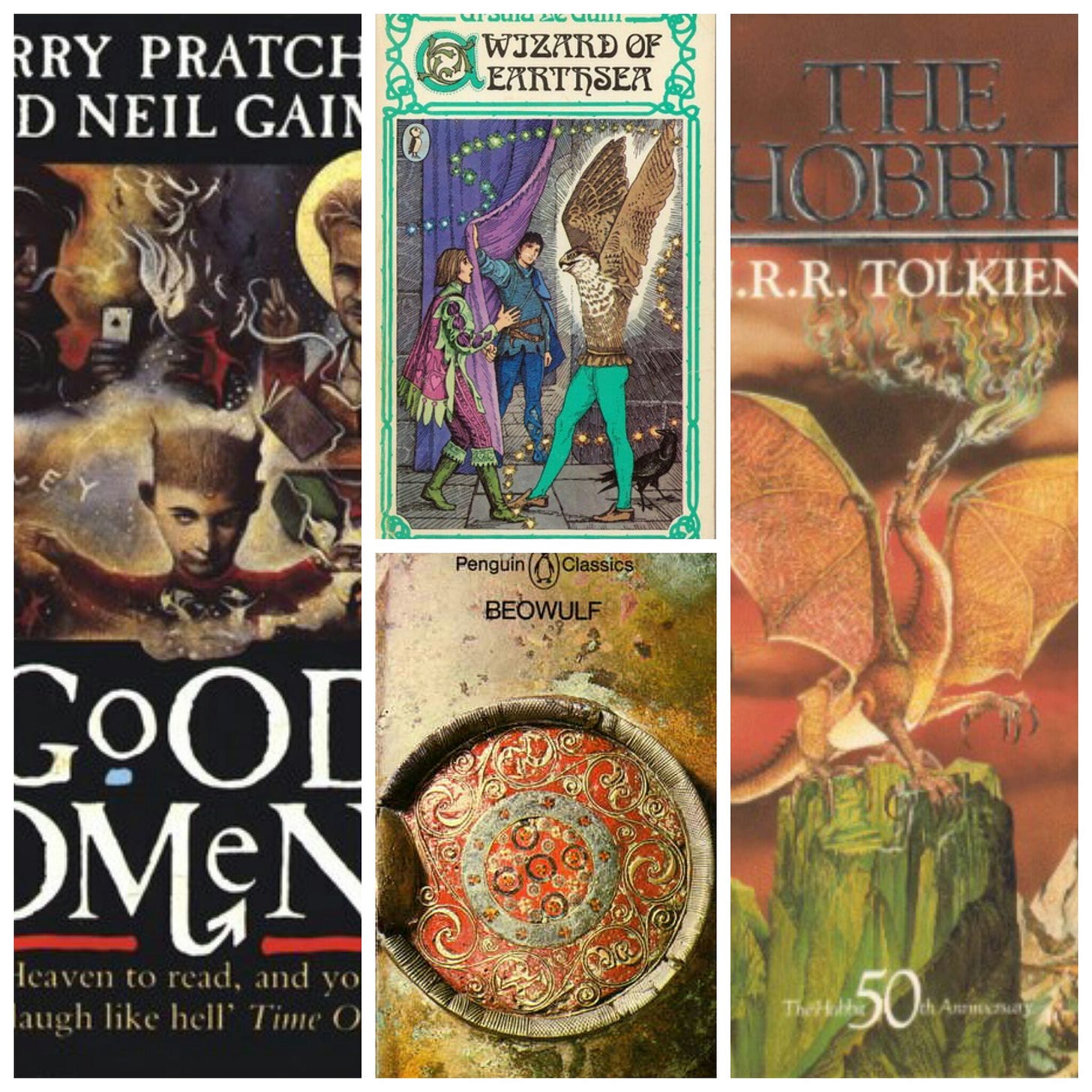
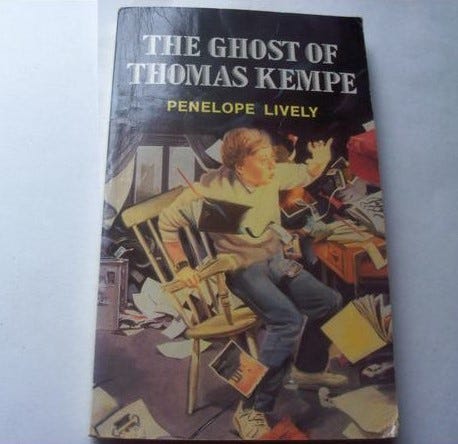
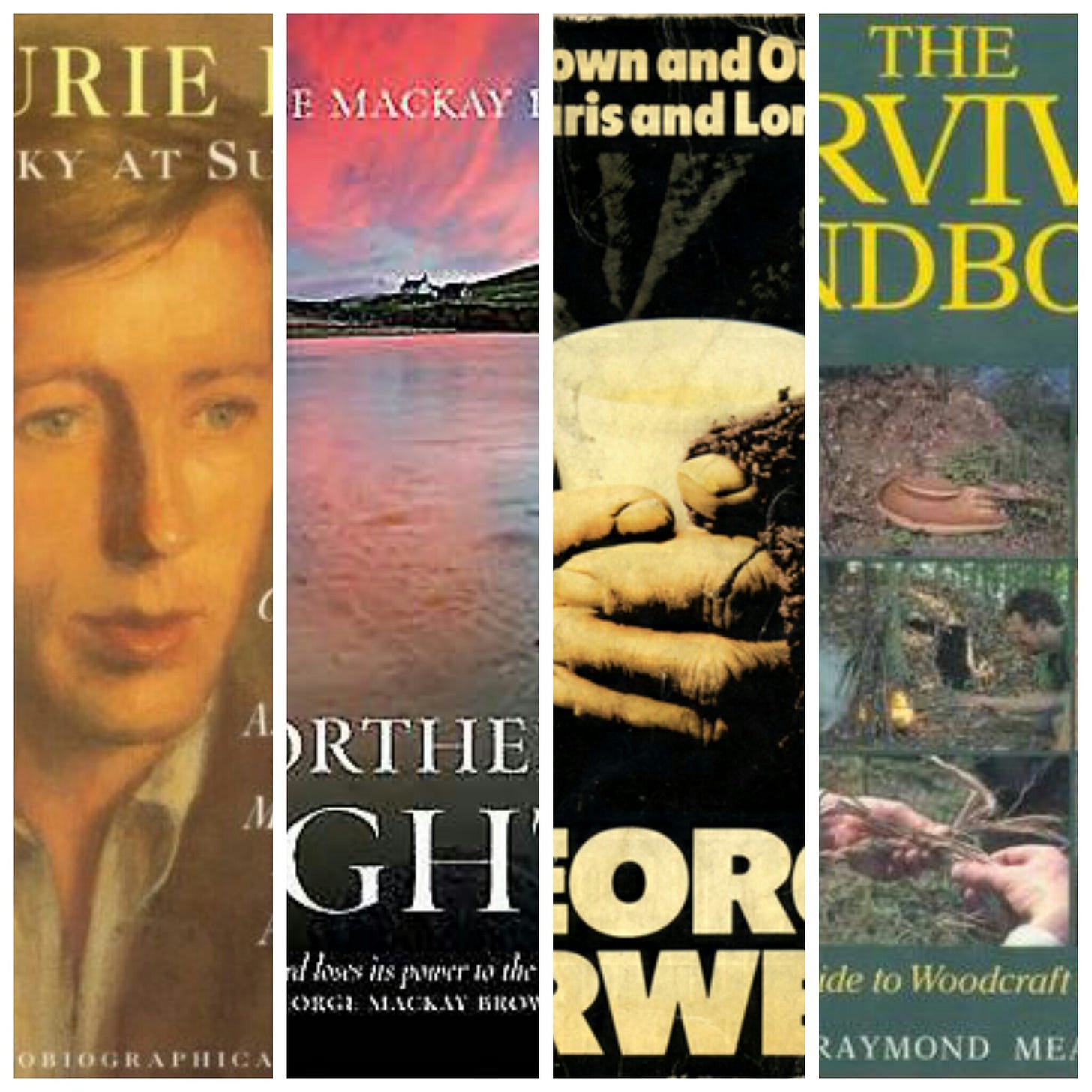
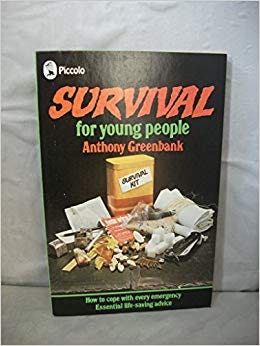
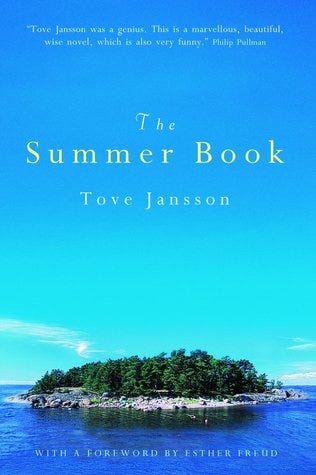
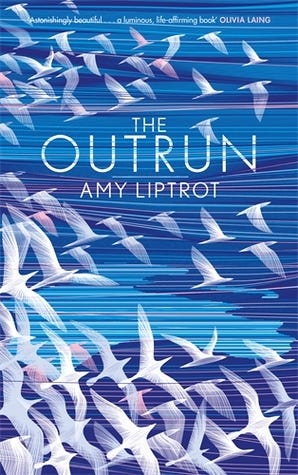
Good Omens is a classic. Think the only thing I could say I’ve read that made me laugh out loud more was Catch-22.
The story of how they wrote Good Omens just shows you the genius of those two writers
Wonderfully written. Lots of great selections in this list. Like you I heard The Hobbit read aloud and it has stuck with me for 40 years. Also like you, I don't like negative Nancy's bloviating about things they disliked in a book. I am a big fan of Mr. Rothwell's newsletter as well. In my newsletter I explore how books intersect with our lives but I am only getting started on my writing journey. Keep up the great work and thanks Mr. Crow.